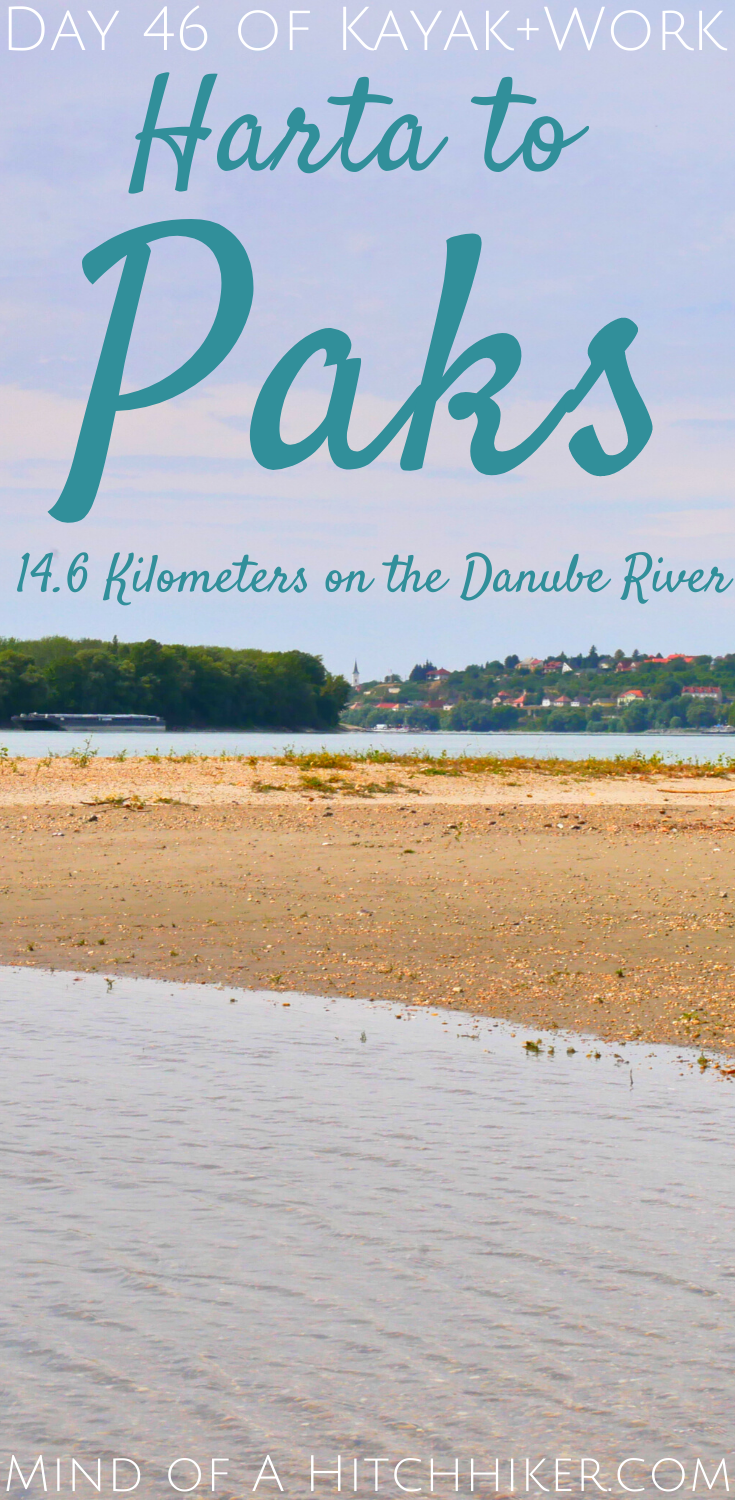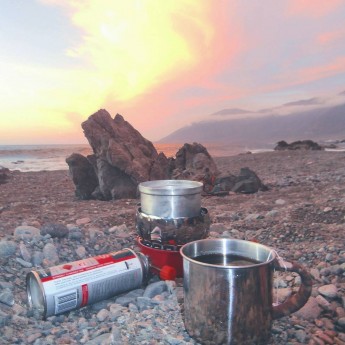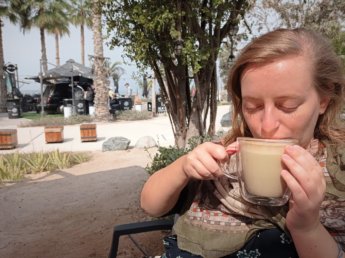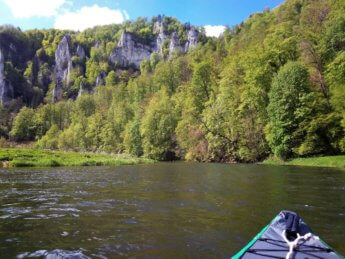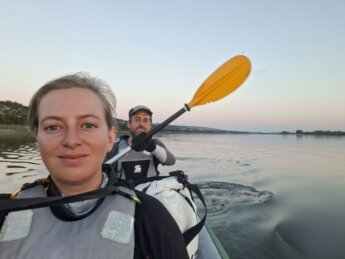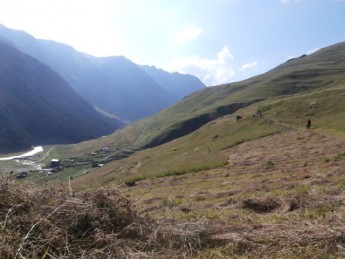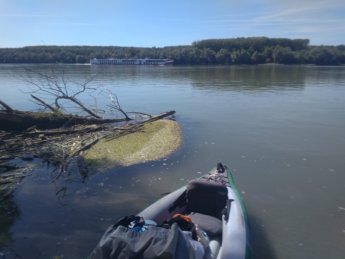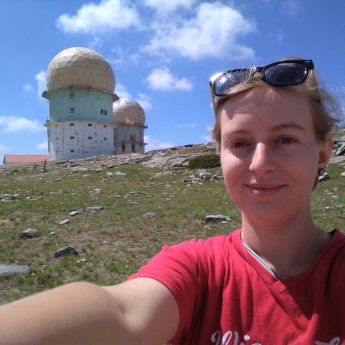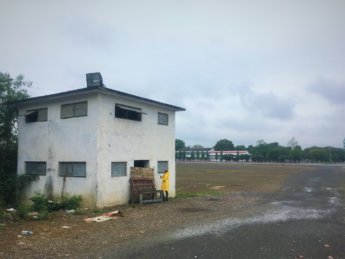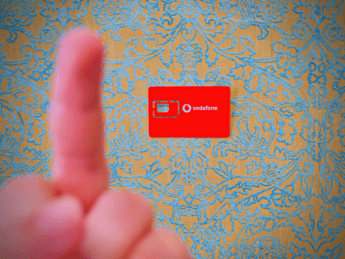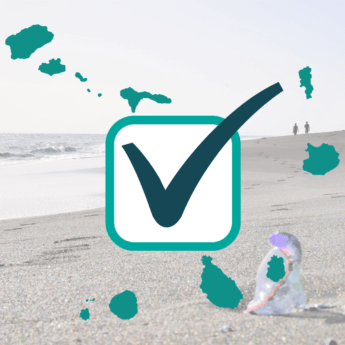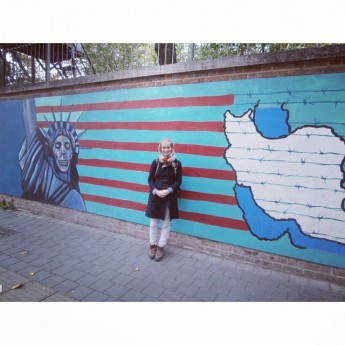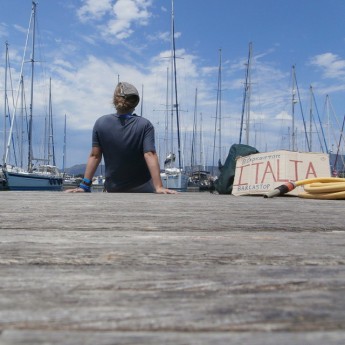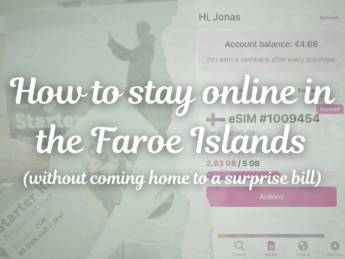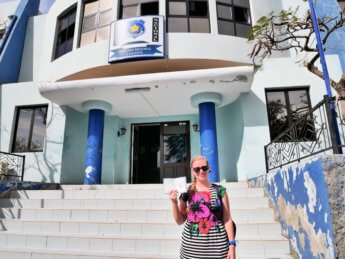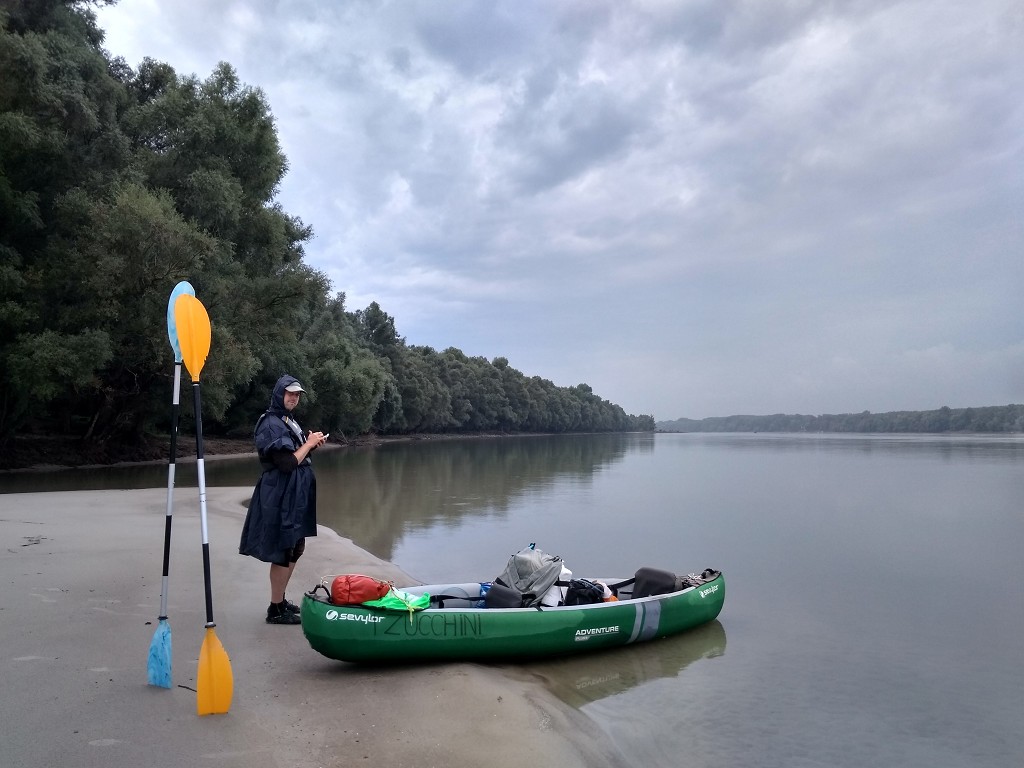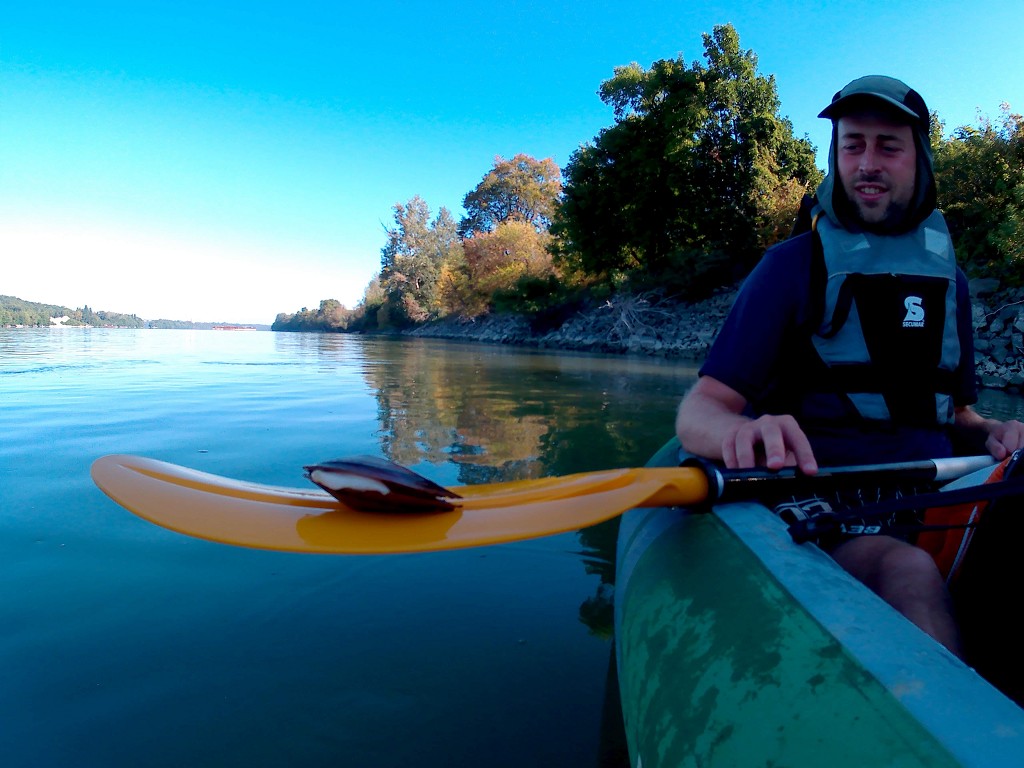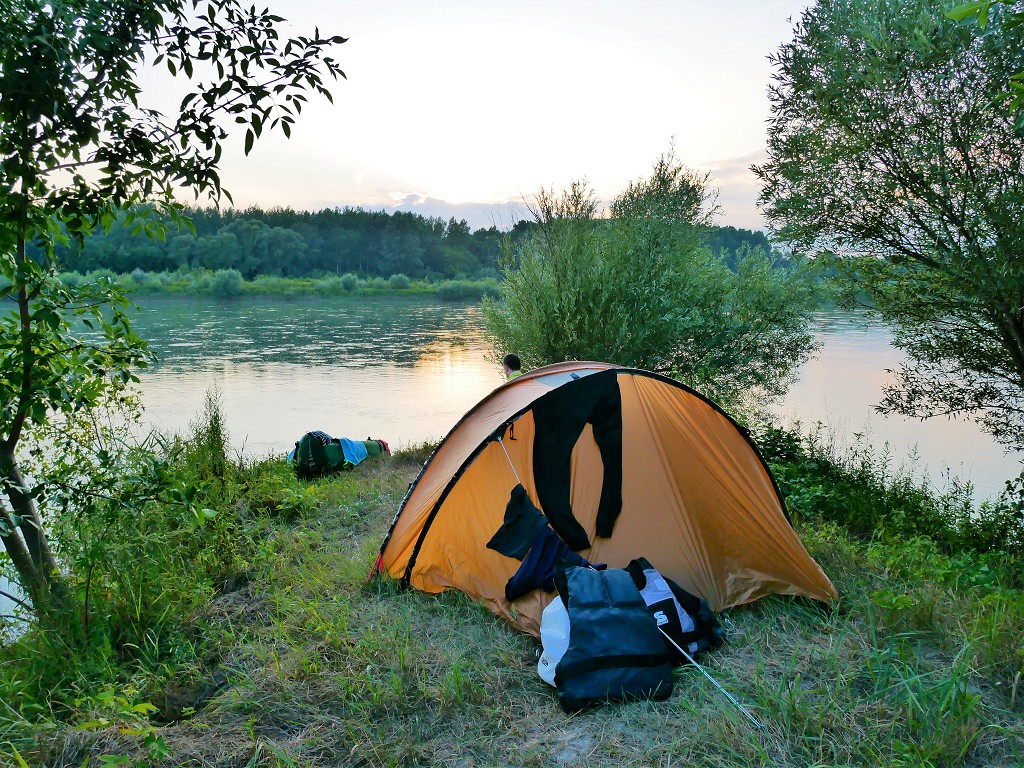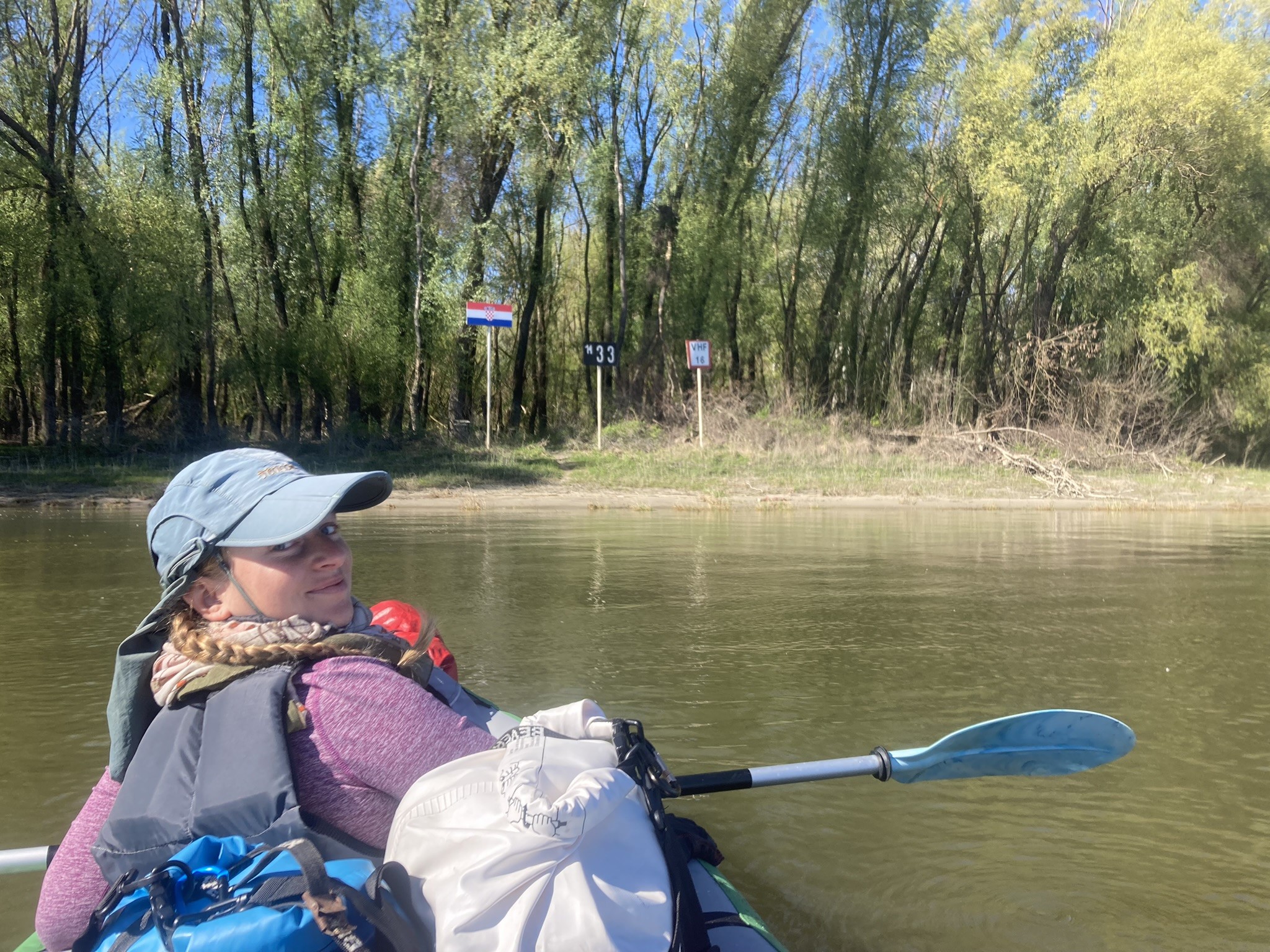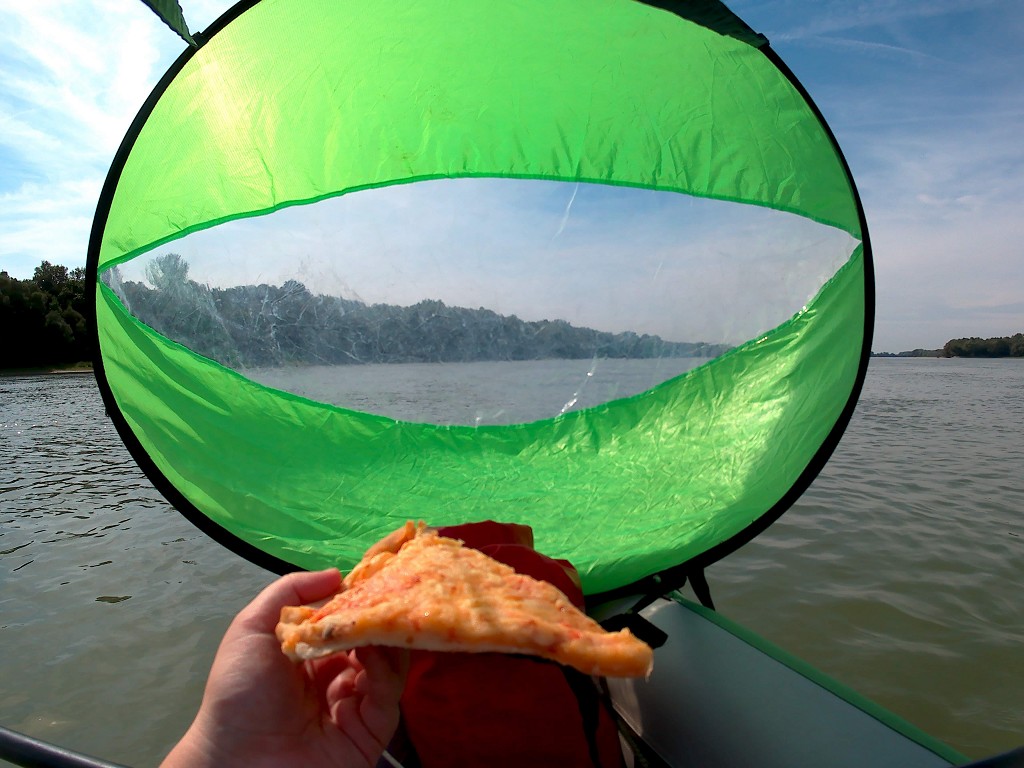
Events narrated in this story happened on Friday the 6th of September, 2019. We paddled Zucchini from Harta to Paks in Hungary.
Want to travel the (entire) Danube River in an adventurous way? Join our Facebook group Danube River Source to Sea: Kayak / Canoe / Bike / Hike / Sail to find your community
Our Stay in Harta
Even though we only stayed in Harta for one night, we really liked the village. All the public spaces were incredibly well-maintained. We even saw a man watering plants outside his property. Not a single dog barked at us from behind a fence. There were some outdoor cats calmly roaming the neighborhood. When the animals are calm and happy to see humans, it often means that they’re well-treated and/or educated.
We got some groceries to prepare sandwiches from a small convenience store, brought the goods home, and then set off to eat out. We chose an upscale pizzeria where the owner directly asked us if she could speak German with us. Jonas said that we indeed speak German, and we got a German and English-speaking menu from her. We’d brought a power bank to charge our phones so we could translate the entire Hungarian menu, but this wasn’t necessary after all.
Jonas said that her German accent sounded like someone who learned German in childhood and not someone who just picked up the basis for tourism purposes. What tourism? This is just a small village that we chose because we could book the accommodation online without talking to anyone. It was simply convenient.
I started translating the Hungarian Wikipedia page for Harta and found out that there’s also a German name for the town: Hartau. It turns out that lots of Swabians settled in Hungary in the 18th century as part of a repopulation program after the Ottomans retreated. They’re called Danube Swabians and they tend to speak both Hungarian and German in Hungary. They also live in other stretches of the Danube that are still upcoming when we continue paddling in 2021.
We had a great meal at Kisvendéglő Étterem & Pizzéria and even took some pizza slices home.
Leaving Harta for Paks
Just like when we left Dunaújváros, we only packed the blue bag on the morning of departure. With a distance of about 15 kilometers ahead of us, we weren’t really in a hurry to get going. We took our sweet little time to prepare the sandwiches, drink an iced coffee (yuck), and pack the blue dry bag.
The hike back to the waterfront was tougher on me than anticipated. When we arrived at our spot of the previous day, we saw that a man occupied the slipway to fish at. We started prepping our boat on the same spot we’d packed it the previous day and would see if the man stood his ground or if he’d perhaps move. He didn’t move. But the slipway was quite steep, so we decided to use the beach instead.
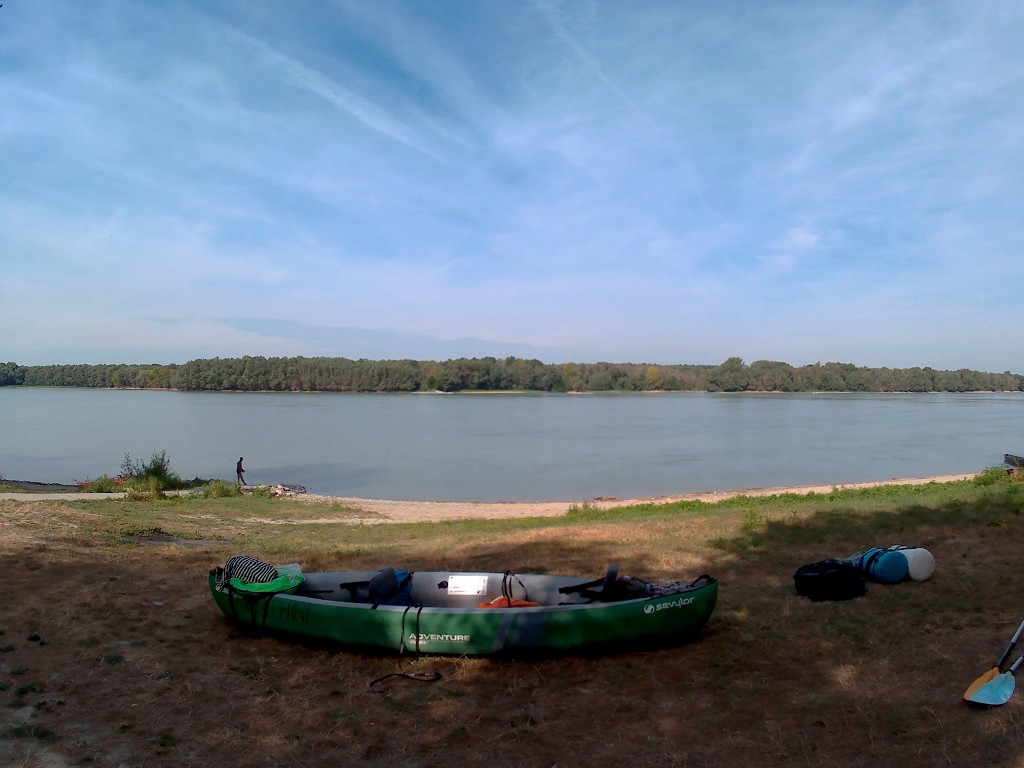
At around 10:30 in the morning, we left Harta for Paks. While we were putting the boat in, the fisherman on the slipway looked over in our direction. He started talking to us in German (!) whether this was our first time on the water. Jonas answered, “No, we’re already on the road for a while, since Germany.”
Jonas interpreted the comment as small-talk conversation-starting. I interpreted it as us looking incompetent, still. After 45 paddle days. Words can hurt, you know?
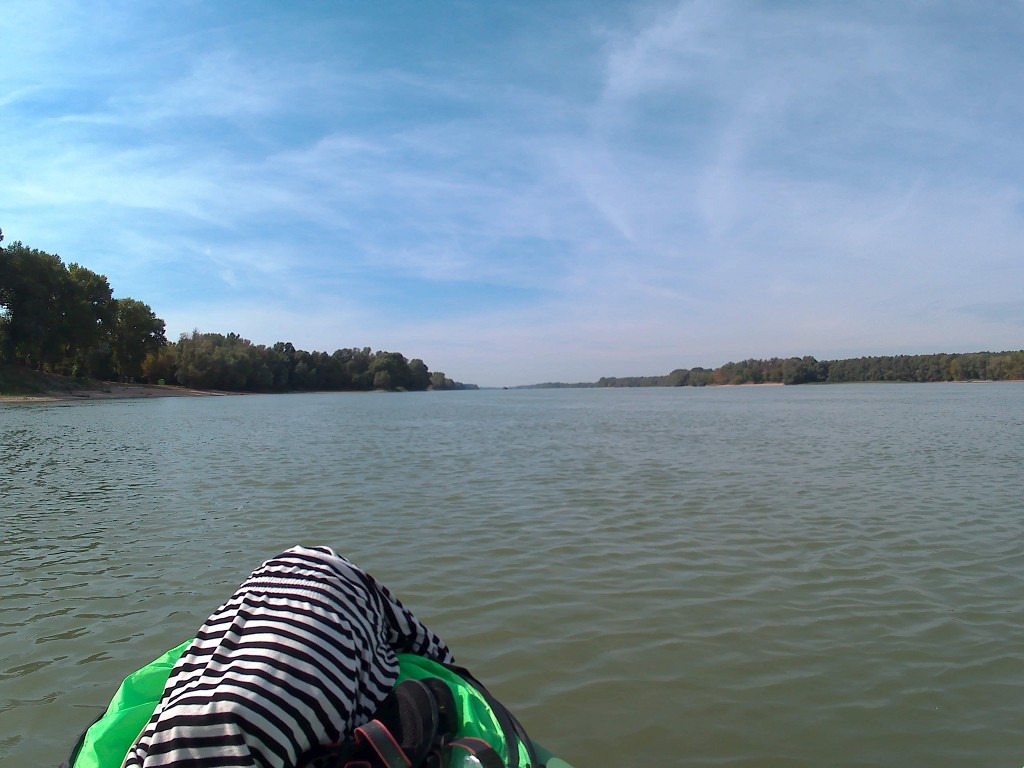
Paks Trivia
While we’re still getting settled into our boat, an empty cargo ship somehow pushing another empty cargo ship passes us traveling upstream. At first, it even looked like a cruise ship to me. Jonas repeated the thing he said a couple of weeks earlier: “Paks has the only active nuclear power plant in Hungary. You like nuclear power plants.” Okay… He continued: “It produces about 50% of Hungary’s power needs.”

“Ho ho ho wait a minute, it’s only 40% tops,” I said, having read the Wikipedia page myself. “And we won’t even pass the nuclear power plant today, as it’s much further south than our exit spot.”
Whatever, we continued paddling.
I tried to finish an Instagram Story I’d prepared, but the signal bar on my phone quickly decreased to none. Shit. I’ll wait until the next village to wrap this up.
There was a slight tailwind that had the potential to keep our sail up. There still was quite some shadow on the left-hand side of the river, but in order to use the wind, we’d have to paddle more in the middle of the river (or so I thought). What ensued was an annoying day with lots of false hope and only a little bit of help from the wind.
Befriending a Hoverfly
I’m very low-energy. I notice it quite early already that perhaps my body is aching from the previous day, or perhaps I had too much beer, or I just didn’t sleep well. We’re not actually paddling much in the shadow and this irritates me. We might as well cross to the right-hand side if we’re not going to use the diminishing shadow. And perhaps the wind isn’t blocked by the trees on that side. Paks is also on the right-hand side. But I don’t share these feelings.
Instead, I let myself be distracted by things. Like this black and yellow hoverfly, that’s following my grey paddle glove while I make circular motions. It could be interesting to see what exactly it wants from my glove, so I stop paddling and hold my hand really still. It also just irritates me that these hoverflies can keep flying stationarily forever. They can even rub their hands together in the ominous ways regular house flies can, but midair.
The hoverfly lands on the grey glove of my right hand and starts analyzing the dirt contents of that glove with their foot-like tongue. I don’t think I’ve ever seen one sit still for more than half a second. The hoverfly walks over my glove and never touches my skin. It seems pretty content there and I don’t think it will leave without encouragement. I hold my left glove closer to it and the fly walks over to my left hand. I show the fly to Jonas, who reacts more positively than anticipated.
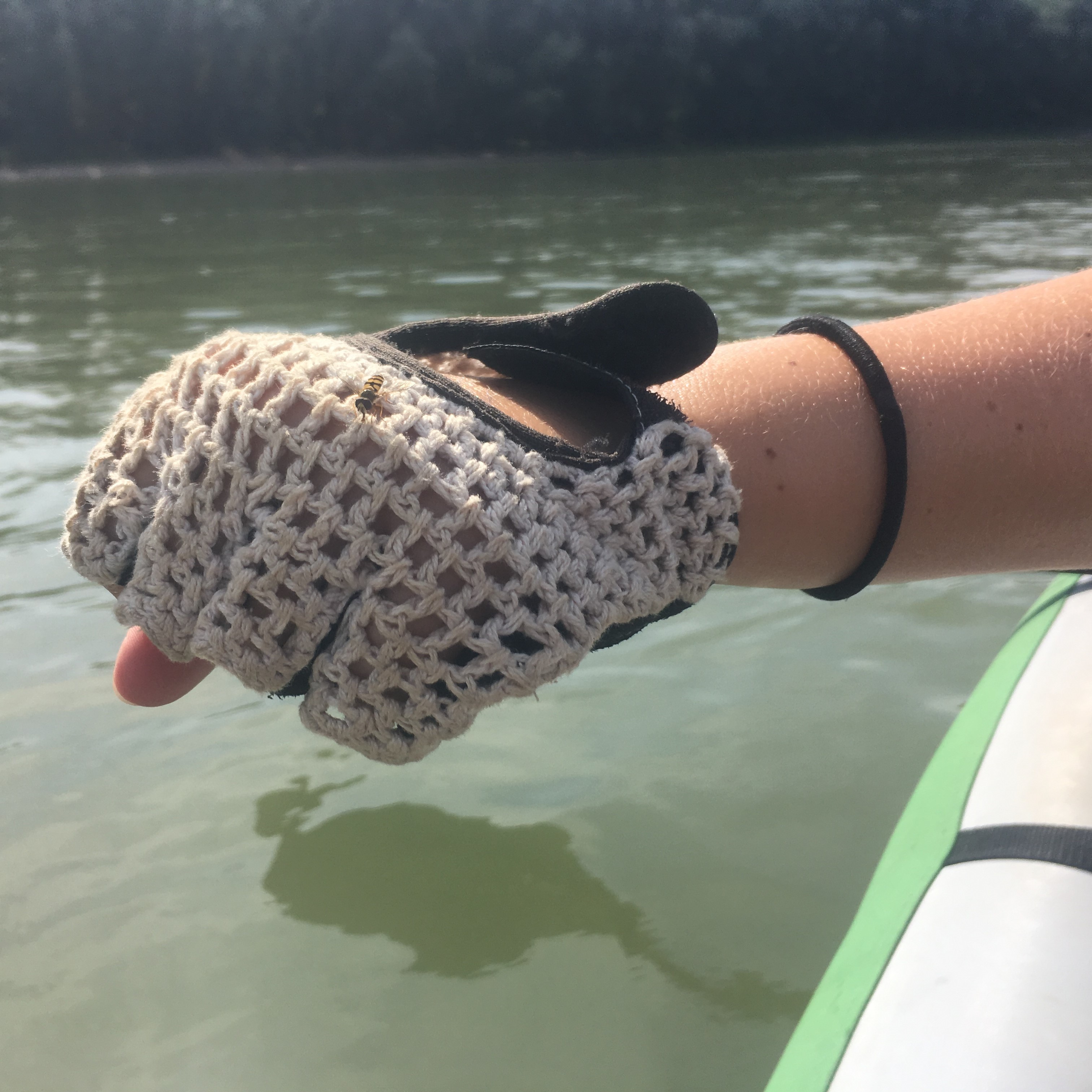
I’m done with bonding with the fly and wag it in Jonas’ direction. The fly sits down near him after hovering some more above our dry bags. I think we officially have a species that’s hitchhiking our boat, perhaps until we make landfall again.
Boat Pizza near Ordas
There’s not much going on for quite a while. I try to use the sail and paddle a little here and there, mostly without success. I’m a bit worried about the next paddle day on Monday after the weekend. We’ll need to paddle more than 40 kilometers down the Danube. Jonas refers to it as the “Endgegner“, which is a word he presumes I know. Endgegner means ‘final boss’ and is popular in video games. My main worry is that the current weather prediction says it will be 17°C with rain and thunderstorms. This could turn out really ugly.
Something shiny reflects at us from a few kilometers downstream. I’m pretty sure it’s a moored speedboat that’s reflecting the sun. Jonas thinks it might be something bigger. We’re slowly paddling towards it. I recently started calculating our average speeds on every paddling day in a spreadsheet, and suddenly I’m worried that today will bring down our average. It’s silly and I’m aware that it’s silly, but I can’t help that it’s on my mind.
I suggest eating the three four-cheese pizza slices wrapped in aluminum foil. As expected, Jonas is enthusiastic about the idea. I give him a slice and we both munch from the boat. The kayak sail hangs slack as I take a picture of it. The last time we had prepared food in the boat was when we had a Turco-Swabian Seele from Immendingen on the way to Mühlheim.

After sharing both slices, we’re next to the village of Ordas and the origin of the reflections. Jonas says we should eat more pizza we can’t finish the night before paddling so that we can take the rest inside the boat. I think I can’t just plan not finishing a pizza. It’s more an in-the-moment kind of decision.

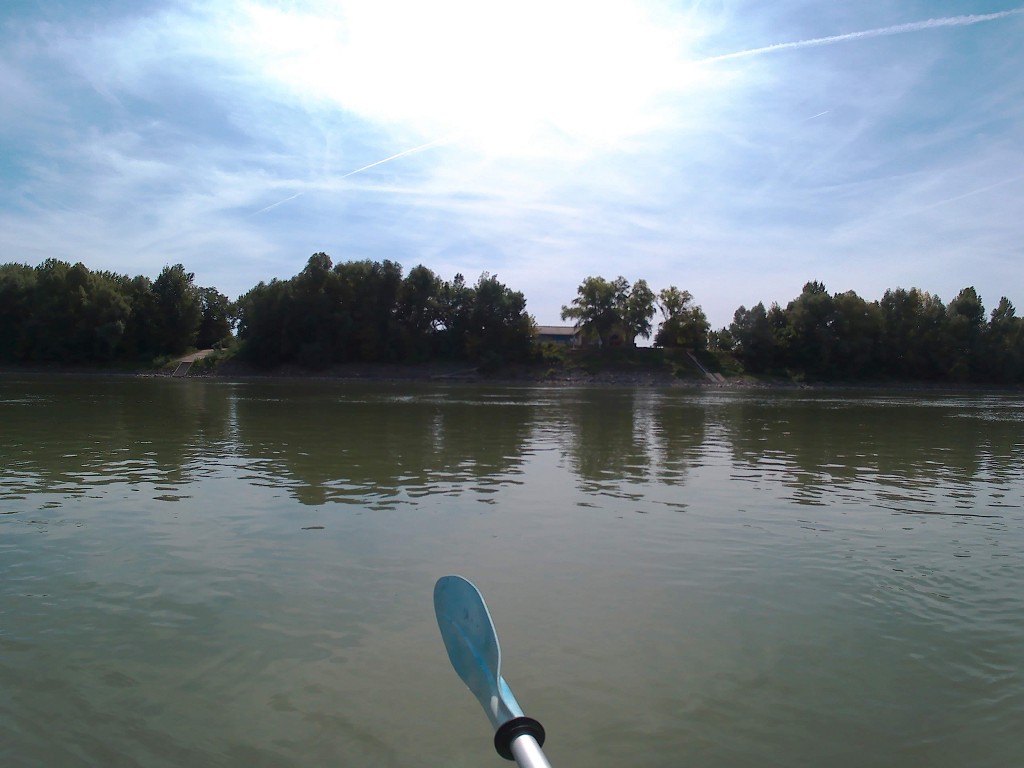
A Break on the Shore
In the distance, we see the first hillside houses of Paks. Jonas confirms it with his map that it’s Ordas that’s to the left of us and Paks in the distance. We cross the river to the right-hand shore. There are a couple of islands ahead of us where we can land our boat, take a short break, and then paddle on to Paks. We see a moored barge at the final river bend in Paks and the faint outline of the ferry that crosses between Paks and Géderlak.
We find a nice beach, but then we see two tents – one in the bright green of my kayak sail, the other in camouflage – and two men with fishing poles. One man wears muted green and camouflage pants and the other dad jeans and some generic colorful shirt. I don’t need to guess which man belongs to which tent.
I spot a tree that forms a little edge some 200 meters downstream and tell Jonas we can get out there. We paddle the extra hundred something meters and then land our boat underneath the thin shadow of the protruding tree. Jonas is first out of the boat and into the woods, but not before lending me a hand out of the boat as I’m slowly drifting away in the increasing current. It’s a little past noon.
On my suggestion, we’re staying on the shore a bit longer than necessary. I want to take some photos of our boat, Jonas, and Paks in the background. It’s quite a nice little beach we picked here, minus the large shells of dead mussels I keep accidentally stepping on and breaking. It’s weird that I can’t exactly remember when the beaches got littered with the shells of freshwater mollusks, but it’s still fairly recent. Especially the big ones like these only appeared downstream of Budapest.
Arriving in Paks
Half an hour later, we continue paddling the final 3.4 kilometers to Paks. I try to compensate for my dicky efforts of paddling before and increase the power. Around the corner, we can see that there are no big ships coming our way. The ferry isn’t crossing either. Below one of two church towers, there’s a promising-looking dock. Somewhere around there is our landing spot in Paks. We both have something marked on our maps to aim for it.
After passing the stationary ferry, we cross closer to the shore. The current is really strong here and drags us downstream. Eventually, we’re out of the current, which is also kind of sad because we’re still not at our exit spot. We paddle on until we see a kind of floating stage on the water (Paksi Víziszínpad) and behind that a floating dock. We double-check our map and then turn our boat around to land there.
Welcome to Paks!
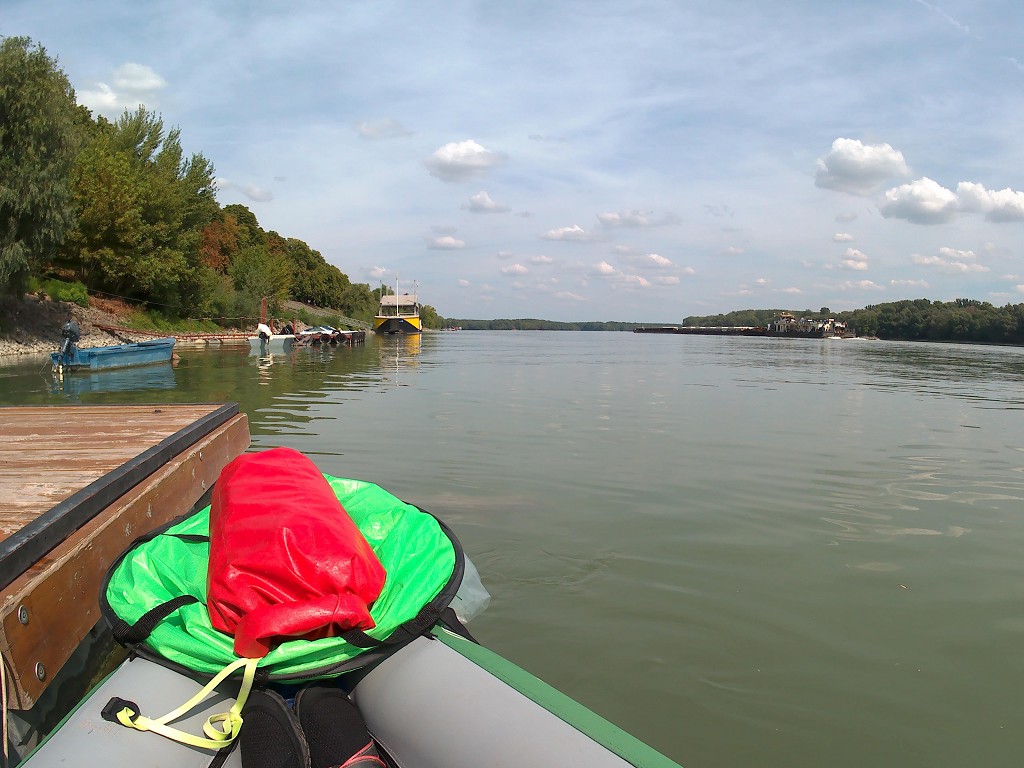
After getting the boat out onto the dock, Jonas checks out on the land where we can dry our boat. We first take our boat up and then return for the bags. Then we dry the boat over the course of one and a half hours in the shadow of a moody tree. We’re right next to a derelict train station named Paks Dunapart (Paks Danube embankment). There are still four uneaten sandwiches left that we prepared that morning. We eat three out of four.
There’s a sign of the tourist information that teaches me that Paks is not pronounced the way we’ve been pronouncing it. The clue? The sign is also in Russian. The Russian name is Пакш, which makes the ‘s’ into ‘sh’ – the same way Budapest is pronounced Budapesht. Shit.
Checking In to Hotel Erzsébet Nagy
We packed up Zucchini, took the tunnel to the hotel, and entered the reception. I don’t really believe in stars, but this is a “4-star hotel”. The young woman who checked us in needed both our passports. While Jonas could barely retrieve a passport copy from his at-the-ready wallet, I didn’t have anything on me that wouldn’t require unpacking a dry bag or three. Eventually, she let me go if I promised to still bring her a passport copy. We did so a few hours later.
The room was nice but small. Jonas and I got down to our unpacking business. We’re staying here for three nights, so everything needed its place. We still had one sandwich left that needed a spot in the well-stocked minibar. Jonas goes on and on about the facilities we’ll probably never use like the pool and the gym.
In the evening we walk through Paks to find food. We settle for a Greek gyros place that has one of these flytraps that makes a loud buzzing sound whenever another fly perishes. It’s a bit hard to chew to.
Now, all we have to do is work, write, and get rested for the final boss fight of Kayak+Work 2019: the 40+ kilometers from Paks to some nameless place before Baja. I open the weather forecast app and feel dispirited.
Feel Free to Share this Article with the Buttons!
